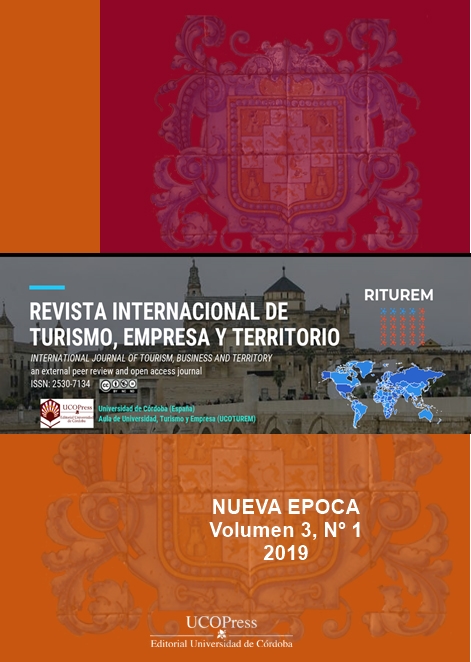SOSTENIBILIDAD, CALIDAD, INNOVACIÓN Y VENTAJA COMPETITIVA EN EL SECTOR HOTELERO: UN ESTUDIO DE CASO
Contenu principal de l'article
Résumé
Resumen
El propósito de este trabajo es analizar por qué hay hoteles más competitivos y rentables que otros. Para responder a esta pregunta, se integran dos enfoques teóricos recientes en el campo de la dirección estratégica de la empresa como son los microfundamentos y las capacidades dinámicas. Concretamente, se analiza cómo la sostenibilidad, la gestión de la calidad y la innovación, como capacidades dinámicas, son capaces de incidir en la competitividad hotelera. El análisis se realiza mediante una investigación cualitativa a través de entrevistas en profundidad a expertos del sector hotelero español.
Palabras clave: sector hotelero, sostenibilidad turística, calidad, innovación, competitividad.
Abstract
The purpose of this paper is to analyze why there are more competitive and profitable hotels. To answer this question, two recent theoretical approaches are integrated in the field of strategic management of the company, such as microfoundations and dynamic capabilities. Specifically, it analyzes how sustainability, quality management and innovation, as dynamic capabilities, influence hotel competitiveness. The analysis is carried out through qualitative research through in-depth interviews with experts from the Spanish hotel sector.
Keywords: hotel sector, tourism sustainability, quality, innovation, competitiveness
Téléchargements
Details de l'article
Avisos de derechos de autor propuestos por Creative Commons
Política propuesta para revistas que ofrecen acceso abierto
Aquellos autores/as que tengan publicaciones con esta revista, aceptan los términos siguientes:
- Los autores/as conservarán sus derechos de autor y garantizarán a la revista el derecho de primera publicación de su obra, el cuál estará simultáneamente sujeto a la licencia Creative Commons CC BY-NC 4.0 (https://creativecommons.org/licenses/by-nc/4.0/deed.es ) , que permite a terceros compartir la obra y permitir obras derivadas siempre que se indique su autor, su primera publicación en esta revista y cuando no se haga uso comercial.
- Los autores/as podrán adoptar otros acuerdos de licencia no exclusiva de distribución de la versión de la obra publicada (p. ej.: depositarla en un archivo telemático o en un repositorio institucional o publicarla en un libro monográfico) siempre que se indique la publicación inicial en esta revista.
- Se permite y recomienda a los autores/as difundir su obra a través de Internet (p. ej.: en archivos telemáticos y repositorios institucionales o en su página web) antes, durante y con posterioridad al proceso de envío, lo cual puede producir intercambios interesantes y aumentar las citas de la obra publicada. (Véase El efecto del acceso abierto).
Références
ABELL, P., FELIN, T. y FOSS, N.J. Building micro‐foundations for the routines, capabilities, and performance links. En: Managerial and Decision Economics. 2008, vol. 29, pp. 489-502.
AMBROSINI, V. y BOWMAN, C. What are dynamic capabilities and are they a useful construct in strategic management? En: International Journal of Management Review. 2009, vol. 11, nº 1, pp. 29-49.
BARNEY, J.B. Firm resources and sustained competitive advantage. En: Journal of Management. 1991, vol. 17, nº 1, pp. 99-120.
BENAVIDES-VELASCO, C.A., QUINTANA-GARCÍA, C. y MARCHANTE-LARA, M. Total quality management, corporate social responsibility and performance in the hotel industry. En: International Journal of Hospitality Management. 2014, vol. 41, pp. 77-87.
BRAMWELL, B. Theoretical activity in sustainable tourism research. En: Annals of Tourism Research. 2015, vol. 54, pp. 204-2018.
CELSI, R.L., ROSE, R.L. y LEIGH, T.W. An exploration of high-risk leisure consumption through skydiving. En: Journal of Consumer Research. 1993, vol. 20, nº 1, pp. 1-23.
FELIN, T. y FOSS, N.J. Strategic organization: a field in search of micro-foundations. En: Strategic Organization. 2005, vol. 3, nº 4, pp. 441-455.
FOSS, N. Why micro-foundations for resource-based theory are needed and what they may look like. En: Journal of Management. 2011, vol. 37, pp. 1413-1428.
GAVETTI, G. Cognition and hierarchy: Rethinking the microfoundations of capabilities’ development. En: Organization Science. 2005, vol. 16, pp. 599-617.
GOMEZELJ, D.O. A systematic review of research on innovation in hospitality and tourism. En: International Journal of Contemporary Hospitality Management. 2016, vol. 28, nº 3, pp. 516–558.
HJALAGER, A.M. A review of innovation research in tourism. En: Tourism Management. 2010, vol. 31, nº 1, pp. 1–12.
HUNT, M.S. Competition in the major home appliance industry. (1972). Tesis doctoral, Harvard University.
KHAN, M. y KHAN, M.A. How technological innovations extend services outreach to customers: The changing shape of hospitality services taxonomy. En: International Journal of Contemporary Hospitality Management. 2009, vol. 21, nº 5, pp. 509–522.
MARTIN-RIOS, C. y CIOBANU, T. Hospitality innovation strategies: An analysis of success factors and challenges. En: Tourism Management. 2019, vol. 70, pp. 218-229.
MORSE, J.M. Approaches to qualitative-quantitative methodological triangulation. En: Nursing Research. 1991, vol. 40, nº 2, pp. 120-123.
MORTENSEN, P.S. y BLOCH, C.W. Oslo manual-guidelines for collecting and interpreting innovation data: Proposed guidelines for collecting and interpreting innovation data. (2005). OECD: Organization for Economic Corporation and Development.
NIEVES, J. y SEGARRA-CIPRÉS, M. Management innovation in the hotel industry. En: Tourism Management. 2015, vol. 46, pp. 51–58.
PORTER, M. Estrategia competitiva. (1982). México: CECSA.
TEECE, D.J., PISANO, G. y SHUEN, A. Dynamic Capabilities and Strategic Management. En: Strategic Management Journal. 1997, vol. 18, nº 7, pp. 509-533.
WANG, C.-H., CHEN, K.-Y. y CHEN, S.C. Total quality management, market orientation and hotel performance: the moderating effects of external environmental factors. En: International Journal of Hospitality Management. 2012, vol. 31, nº 1, pp. 119–129.
WANG, C.L. y AHMED, P.K. Dynamic capabilities: A review and research agenda. En: International Journal of Management Reviews. 2007, vol. 9, nº 1, pp. 31-51.
